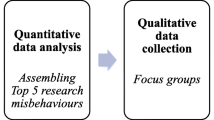Summary
Biomedical research is characterized by a tremendous expansion of knowledge in recent years. Alongside, biomedical research is in the focus of public inerest. Hence, highest quality standards are required to meet the expectations of the scientific community and of the public. A panel of instruments of quality management helps to strenghthen productivity of biomedical research, i.e. 1. improved institutionalization of research; 2. productivity-oriented distribution of ressources; 3. evaluations and 4. quality standards for the performance of research. Quality management is a matter of a vivid discussion in Germany and professors and junior faculty members alike are generally open-minded towards quality management activities to improve output-oriented research.
Similar content being viewed by others
References
Adams, J. (1998) Benchmarking international research. Nature 396: 615–618.
Deutscher Hochschulverband (1998 a) Leistungsorientierte Besoldung. Resolution des Deutschen Hochschulverbandes vom 28. März 1998. Forschung und Lehre: 308.
Deutscher Hochschulverband (1998 b) Leitsätze zur Evaluation. Resolution des Deutschen Hochschulverbandes vom 28. März 1998. Forschung und Lehre: 237.
Deutsche Forschungsgemeinschaft (1998 c) Vorschläge zur Sicherung guter wissenschaftlicher Praxis. www.dfg.de/aktuell/download/empf_selbstkontr.html
Deutsche Forschungsgemeinschaft (1999) Klinische Forschung. Denkschrift. Wiley-VCH Verlag, Weinheim.
EMNID im Auftrag von n-tv (1997) Auswahl und Kontrolle werden bevorzugt. Forschung und Lehre: 406.
Fischer, K. (2000) Die verborgenen Quellen des Neuen. Forschung und Lehre: 14–18.
Kieser, A. (1998) Das Idealbild der Evaluationskonstrukteure. Forschung und Lehre: 408–411.
Künze, R. (1997) Corporate identity bilden. Forschung und Lehre: 636–639.
Rothmund, M. (1997) Die Stellung der klinischen Forschung in Deutschland im internationalen Vergleich. Dtsch. Med. Wschr. 122: 1358–1362.
Van Gijn, J. (1996) Randomized trials. Lancet 237: 1234–1235.
Weule, H. (1999) Blick aus der Praxis. Forschung und Lehre: 516–519.
Winnacker, E.-L.; Markl, H. (1999) DFG und MPG Eckpfeiler der Forschung. Forschung und Lehre: 355–357.
Author information
Authors and Affiliations
Corresponding author
Additional information
Contents of this paper have been given as lecture at the symposium “Quality management in phoniatries and pedaudiology” on the occasion of the 75th birthday of Prof. G. Kittel at the University of Erlangen-Nuremberg, Germany (organization: Prof. U. Eysholdt and Asst. Prof. F. Rosanowski).
Rights and permissions
About this article
Cite this article
Efferth, T. Quality management for biomedical research in Germany. Theory Biosci. 120, 57–63 (2001). https://doi.org/10.1007/s12064-001-0032-x
Received:
Accepted:
Issue Date:
DOI: https://doi.org/10.1007/s12064-001-0032-x




